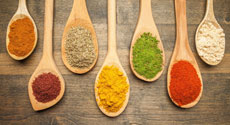
Tip: Common herbs and spices don’t just make your food taste better – they offer potent health benefits that make you feel better too.
By the Chef Marshall O’Brien Group
The herbs and spices sitting in your spice drawer are powerful allies for your health. Besides improving the flavor of food without the excess sodium of the salt shaker, many offer potent healing benefits. Chef Marshall highlights some of the most powerful healing herbs and spices, many of which you may already have in your kitchen. When you incorporate herbs and spices into every meal, your food not only tastes better but you also feel better.
7 Potent Healing Herbs and Spices
These common, effective healing herbs and spices deserve a spot in your spice pantry:
- Cayenne – Along with its characteristic spicy kick, cayenne adds antioxidants and anti-inflammatory qualities to your food, boosts metabolism, relieves congestion, helps fight cancer and reduces post-meal blood sugar in diabetics.
- Cinnamon – Cinnamon is a potent spice for type 2 diabetics, helping lower blood sugar levels and improve insulin sensitivity. Cinnamon may also decrease triglycerides and total cholesterol, and is antibacterial and anti-inflammatory. As an added bonus, cinnamon can help reduce your sugar intake – it adds sweetness to dishes without adding any sugar.
- Fennel – Ever wonder why Indian restaurants offer fennel seeds after your meal? Fennel is prized, not only for cleansing your palate, but as a powerful digestive aid. Fennel is useful for easing heartburn, intestinal gas, bloating, loss of appetite, colic in infants and relieving abdominal pain in patients with Inflammatory Bowel Syndrome (IBS).
- Garlic – One of the most useful culinary spices, garlic is also beneficial for your heart, brain and immune system. Eating garlic daily can help reduce your risk of heart disease and dementia. Garlic also helps to prevent and speed recovery from the common cold.
- Ginger – Ginger is very effective against nausea, soothing morning sickness, nausea from surgery and chemotherapy and may even be helpful for motion sickness. Ginger is also a digestive aid and combats inflammation, reducing arthritis pain and sore muscles.
- Peppermint – Used for centuries as a digestive aid, peppermint is anti-inflammatory, anti-bacterial, helps relieve intestinal gas, and helps normalize the time it takes food to pass through your digestive tract. In controlled studies, peppermint oil was more effective at treating symptoms of IBS than pharmaceuticals. Peppermint may also help lift your mood and help you focus.
- Turmeric – Recent research suggests turmeric is a powerful anti-cancer agent, high in antioxidants. Turmeric’s anti-inflammatory properties matched those of some anti-inflammatory drugs, without the side effects. Turmeric is beneficial for your cardiovascular system, joints, brain and mood, and may help prevent type 2 diabetes and Alzheimer’s disease. Consuming turmeric along with black pepper increases your body’s ability to absorb and use it.
Incorporate Spices into Every Meal
Whether you add cinnamon to your morning bowl of oatmeal, spice up your soup with a pinch of cayenne, or load your turkey meatballs with garlic, oregano and parsley, herbs and spices make every meal taste better – and help you feel better, too. Try one of Chef Marshall’s favorite spice-rich dishes to start incorporating more spices into your weekly menu. His Slow Cooker Chicken Chili is an easy weeknight meal with a kick of cayenne, chilis and garlic. Curried Sweet Potatoes and Artichokes is a dish full of flavor and anti-inflammatory properties from turmeric and curry powder.
You will love the way you feel!
 The Chef Marshall O’Brien Group is a dedicated assembly of professionals based in Minneapolis, Minnesota, committed to the goal of using nutrition to get kids and families to lead happier, healthier lives.
The Chef Marshall O’Brien Group is a dedicated assembly of professionals based in Minneapolis, Minnesota, committed to the goal of using nutrition to get kids and families to lead happier, healthier lives.